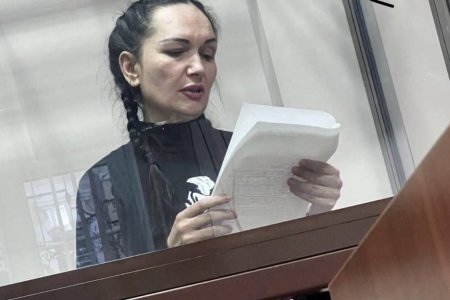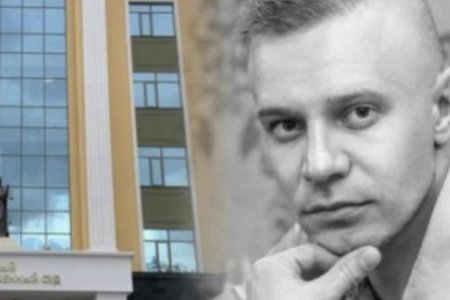
A Russian court has passed monstrous sentences against a Ukrainian family from occupied Melitopol, accusing them of involvement in explosions, one of which killed a notorious collaborator, as well as of an unsuccessful attempt to blow up railway tracks used by Russia for its war of aggression against Ukraine. Russia claimed that acts of resistance against its illegal occupation of Ukrainian territory constituted ‘terrorism’, while obtaining ‘confessions’ to such actions through savage torture. Artem Murdid; his mother Anna Murdid, and his partner Anna Voshkoder denied the charges, with Artem telling the court that he learned of the actions he had supposedly committed from the FSB officers who were torturing him. Judging by his final address to the court, he was accused by the Russians who had invaded his country, of “trying to create division” between Ukrainians and Russians.
Artem Murdid was sentenced to life imprisonment, with the first eight years in a prison, the harshest of Russia’s already brutal penal institutions. Anna Murdid, who is not a young woman and has medical issues, requiring regular treatment, was sentenced to 22 years; Anna Voshkoder, who has a small child – to 20 years. The sentences, together with massive fines (of 900 thousand, 600 thousand and 550 thousand, roubles, respectively) were announced by ‘judge’ Aleksandr Vasilievich Generalov from the Southern District Military Court in Rostov on 2 June 2025. This court has been involved in Russia’s persecution of Ukrainian political prisoners since 2014, and Generalov himself has already passed several such illegal sentences.
The entire family were accused of having taken part in a series of supposed ‘terrorist attacks’, including the explosion which killed a local traitor and collaborator Ivan Tkach and some other alleged attacks on Russian-installed Melitopol ‘officials’. The prosecution also claimed that they had been involved in an unsuccessful attempt to cause an explosion on railway lines.
At this point, the indictment takes on elements which seem copy-pasted from one such case to another. All of the above is supposed to have been overseen by an essentially unidentified ‘Oleh’ from Ukraine’s Security Service [SBU] whom Artem Murdid allegedly contacted in the summer of 2022. The two women were claimed to have “followed the movement of trains and these ‘officials’” and helped to obtain explosives via secret hiding places.
The alleged attempt to blow up railway tracks was supposed to have been carried out by Artem Murdid on 8 July 2022. The bomb was, however, noticed and defused. As well as claiming that Artem’s mother and wife were involved in following the movement of particular trains, the prosecution also asserted that Anna Voshkoder had been with Artem when he collected the explosives from the hiding place. All three defendants allegedly transported the bomb by car to near the railway tracks.
It was chiefly Artem Murdid who was accused of one successful attack, namely that against Melitopol collaborator Ivan Tkach on 14 March 2023. Tkach was suspected, among other things, of having provided transport to the Russian army to bring in Russian soldiers, as well as mercenaries from the notorious Wagner unit. Artem was also charged with two other unsuccessful attacks on collaborators. One of these was against Serhiy Deriabin, occupation head of the railway station. There was, indeed, an attack on him and his wife and fellow traitor, Oksana Deriabina on 23 September 2023, however earlier reports that the two had been killed were later refuted. There was also an unsuccessful assassination attempt against the Russian-installed ‘head of the Melitopol administration’, Mykola Volyk.
All such ‘trials’ and sentences are in flagrant violation of international law which prohibits Russia, as occupying state, from applying its legislation on occupied Ukrainian territory and forcibly deporting Ukrainian citizens to Russia. This was one of a series of ‘trials’ since Russia’s full-scale invasion of Ukraine in which the invaders claimed that Ukrainians, accused of acts of resistance, had committed ‘acts of international terrorism’, under Article 361 of Russia’s criminal code. This rather surreal charge by an invader refers to “an explosion, act of arson or other actions, committed outside Russia and jeopardizing the life, health, freedom or inviolability of Russian citizens “for the purpose of violating the peaceful co-existence of states and peoples, or aimed against the interests” of Russia.” All three defendants were charged with (one or more instances of) Article 361 § 1; with Article 205 § 4 (‘an act of terrorism’); Article 205.4 § 2 (‘organization of or involvement in a terrorist organization’), as well as with Article 222.1 § 3a (‘unlawful possession, etc. of weapons, explosive devices, etc’). Artem was additionally accused of preparing explosives under Article 223.1 § 3.
Mediazona reports that all three defendants, in their final address to the court, insisted that the ‘confessions’ which formed the basis of this ‘trial’ had been extracted through torture. It is clear from the deranged accusations that they rejected in these statements just how the aggressor state tried to explain acts of resistance in which Russian-installed collaborators were targeted, as well as railway tracks used to transport men and military technology used for Russia’s war against Ukraine. They were obviously accused of “trying to create division” between Ukrainians and Russians; of being “supporters of Nazi ideology”; of ‘contempt for people (presumably Russians) because of their nationality, etc, all of which they denied.
29-year-old Artem Murdid called the entire ‘case’ politically motivated and based on ‘confessions’ obtained through savage beatings and torture. He denied having ever, in his life, committed any unlawful acts and pointed out that he had only learned of the charges from the “officers of Russian enforcement bodies” who used beatings and torture to force him to give the ‘testimony’ on which the case was based. “I have never been a supporter of Nazi ideas, I lived in a multinational country, never contemplating the possibility of treating somebody with disdain because of their nationality. I never had any intention to harm the interests of the Russian Federation, let alone its citizens. I never for a moment pursued the aim of causing division between the two peoples…”
Anna Murdid also described the electric shocks and beatings used to extract her ‘testimony’. She asked the court to consider her state of health and the fact that she needs regular medical care.
This was ignored, as was the fact that Anna Voshkoder has a small child from a previous marriage who was living with her, Artem and his mother.
Judging by all of the alleged attacks, it seems likely that the family were seized soon after 14 March 2023, when Ivan Tkach was killed. While there is no way of independently verifying any of the above elements of the indictment, there is considerable evidence that Russia’s FSB and other enforcement bodies seize people after such attacks on the flimsiest of grounds, or without any at all. Such ‘grounds’ are then obtained through horrific forms of torture, with the lack of any substance to the charges and even detailed descriptions of the torture endured and falsifications, standardly ignored by Russian prosecutors and the ‘court’.
The sentences are not final, and will, presumably, be appealed.



